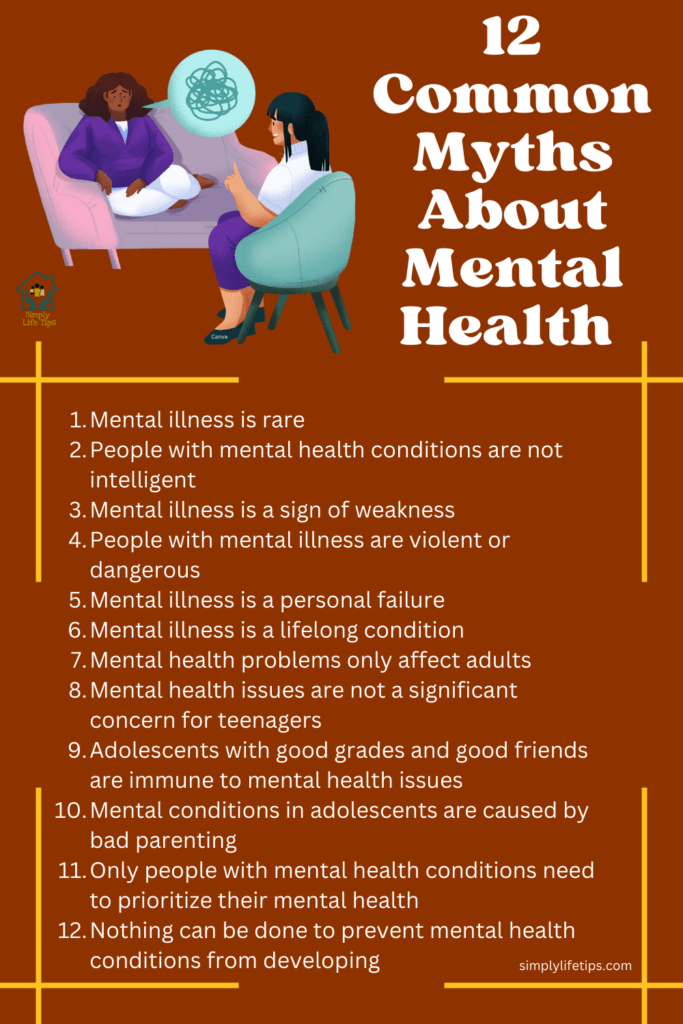Today, most people are living with common myths about mental health and that creates a lot of problems in their lives. Mental health is a critical aspect of overall well-being, yet it remains a topic that is often surrounded by misconceptions and stigma. These misconceptions can prevent individuals from seeking the support they need and deserve, leading to further complications in their mental health. By breaking down these myths and challenging the assumptions that fuel them, we can create a culture that encourages people of all ages to seek help when they need it. In this article, we will explore and debunk some of the most common myths about mental health. By understanding the truth, we can work together to promote mental health awareness and support those who may be struggling with their mental health.
Common Myths About Mental Health
We all know mental health is an essential part of overall wellness, yet it remains a topic that is often misunderstood or stigmatized. Many people hold misconceptions about mental health that can prevent them from seeking treatment or supporting loved ones who may be struggling. In this blog post, we will explore some of the most common myths about mental health and what you can do to dispel them.
By dispelling myths about mental health, we can break the stigma surrounding it and create a culture that encourages individuals of any age to seek support when needed. Below are 12 common myths about mental health that need to be addressed:
12 Common Myths About Mental Health

Myth #1: Mental illness is rare
Fact: Mental illness is more common than many people realize. According to the National Alliance on Mental Illness, approximately one in five adults in the United States experiences mental illness each year. This means that millions of people are affected by mental illness, and it is nothing to be ashamed of.
Myth #2: People with mental health conditions are not intelligent
Fact: Mental illness does not discriminate based on intelligence, social class, or income level, just like physical illnesses. Anyone can be affected by mental illness.
Myth #3: Mental illness is a sign of weakness
There is a common understanding that having a mental health condition is a sign of weakness, and individuals with strong willpower would not have such a condition.
Fact: Mental illness is not a sign of weakness. It is a medical condition that requires treatment, just like any other illness. Many factors can contribute to the development of mental illness, including genetics, life experiences, and environmental factors. Seeking help for mental illness takes courage and strength, not weakness.
Mental health conditions are not a sign of weakness or a lack of willpower. People do not choose to have mental health conditions. Recognizing the need for help and support for a mental health condition takes strength and courage. Anyone can develop a mental health condition, and it is essential to promote understanding and acceptance of mental health issues to remove the stigma and encourage individuals to seek help.
Myth #4: People with mental illness are violent or dangerous
Fact: Most people with mental illness are not violent or dangerous. People with mental illness are more likely to be victims of violence than perpetrators. It is important to avoid stereotypes and remember that each person with mental illness is unique and should be treated with compassion and understanding.
Myth #5: Mental illness is a personal failure
Fact: Mental illness is not a personal failure. It is a medical condition that can be treated with appropriate care and support. Blaming someone for their mental illness is not only unhelpful, but it can also perpetuate the stigma surrounding mental health.
Myth #6: Mental illness is a lifelong condition
Fact: With appropriate treatment and support, many people with mental illness can recover and lead fulfilling lives. Treatment options may include therapy, medication, and lifestyle changes. It is important to remember that recovery looks different for everyone and may take time, but it is possible.
Myth #7: Mental health problems only affect adults
Fact: Mental health problems can affect people of all ages, including children and adolescents. Half of all lifetime cases of mental illness begin by age 14. Early intervention and treatment can help young people build resilience and improve their long-term outcomes.
Myth: #8 Mental health issues are not a significant concern for teenagers
Many parents have the wrong thinking that teenagers just have hormonal fluctuations and seek attention when they act out and that is not a mental health issue.
Fact: While teenagers may experience mood swings due to hormonal changes, it is essential to recognize that adolescents can struggle with their mental health. 14% of the world’s teenagers experience mental health problems, and suicide is the fourth leading cause of death among those aged 15-19. Additionally, half of all mental health conditions begin by age 14. It is crucial to prioritize mental health support and resources for teenagers to ensure their overall well-being. A healthy teenage lifestyle is very important.
Read How to overcome teenage depression?
Myth #9: Adolescents with good grades and good friends are immune to mental health issues
Many parents think that adolescents who achieve good grades and have many friends are immune to mental health conditions because they have nothing to be depressed about.
Fact: Depression is a prevalent mental health condition that can result from various social, psychological, and biological factors. It can affect anyone regardless of their academic achievements or social standing. Even high-achieving adolescents may feel pressure to excel, leading to anxiety, or experience challenges in their personal lives. They may also experience depression or anxiety without an identifiable cause. It is crucial to recognize that mental health conditions can impact anyone, regardless of their external circumstances, and provide support and resources for those who need them.
Read How to convert depression into happiness?
Myth #10: Mental conditions in adolescents are caused by bad parenting
Fact: Numerous factors, such as poverty, unemployment, exposure to violence, migration, and other adverse circumstances, can impact the well-being and mental health of adolescents and their caregivers. Mental health difficulties can occur in adolescents from loving and supportive homes, just as they can in those from homes where caregivers require support to maintain a healthy environment for adolescent development. Caregivers can play a vital role in helping adolescents overcome any problems they may face with appropriate support. It is essential to understand that mental health conditions are complex and multifaceted, and blaming parents for their children’s mental health struggles is not helpful or accurate.
Myth #11: Only people with mental health conditions need to prioritize their mental health
Fact: Prioritizing mental health is important for everyone, regardless of whether or not they have a diagnosed mental health condition. Just like physical health, mental health is important for overall well-being, and everyone can benefit from taking active steps to improve their mental health.
Myth #12: Nothing can be done to prevent mental health conditions from developing
Fact: Several factors can protect individuals from developing mental health conditions, such as building social and emotional skills, seeking help and support early on, cultivating supportive and healthy relationships with family and friends, creating a positive school environment, and prioritizing healthy sleep patterns and ultimate sleep routine. Overcoming adversity relies on a combination of protective factors, and having biological resistance and strong support systems can greatly benefit an individual’s mental health. Children and adolescents who fare well in the face of adversity often have a combination of protective factors that promote well-being.
- 5 Love languages for healthy relationships
- Tips for healthy relationships with parents
- Importance of a healthy parent-child relationship
- What are the secrets to improving relationships?
How to dispel common myths about mental health?
Education is key to dispelling myths about mental health. By learning the facts and sharing them with others, you can help reduce stigma and improve understanding. Here are some ways you can help:
- Educate yourself: Read books, articles, and other resources about mental health to gain a better understanding of the issues.
- Share information: Share information about mental health on social media, in conversation with friends and family, and in your community.
- Advocate for change: Advocate for policies and programs that support mental health, such as increased access to mental health care, improving school-based mental health services, and reduced stigma.
- Be supportive: If you know someone who is struggling with mental illness, be supportive and encouraging. Encourage them to seek help and let them know that they are not alone.
Remember, mental health is an essential part of overall wellness, and it is important to dispel myths and misconceptions that can prevent people from seeking treatment or supporting loved ones. By educating yourself and others, you can help reduce stigma and improve your understanding of this important topic.
Final Thoughts
Hope, you could understand the common myths about mental health issues. It is essential to understand that mental health conditions can affect anyone, regardless of age, intelligence, social class, or life circumstances. It is also crucial to recognize that mental health conditions are not a sign of weakness, and seeking help for them requires strength and courage. By dispelling common myths surrounding mental health, we can reduce stigma, promote awareness, and encourage individuals to seek the support they need. Together, we can create a culture that prioritizes mental health and provides the resources and care necessary for everyone to thrive. Let us challenge these common myths about mental health and work towards a world where mental health is treated with the same importance and care as physical health.
Is this post helped you to clear the common myths about mental health?
Thank you for your visit.
Don’t forget to share it.
Leave your thoughts in the comment box below.
Chat
References: UNICEF and the World Health Organization created the first in a series of Magnificent Mei comics and an accompanying Teacher’s Guide to support social and emotional learning among adolescents. By promoting social and emotional learning and skills practice, the Comic Book and Teacher’s Guide aim to help promote psychosocial well-being, prevent mental health conditions, and reduce risky behaviours in adolescents. You can download Magnificent Mei comics and an accompanying Teacher’s Guide here.

Mathukutty P. V. is the founder of Simply Life Tips. He is a Blogger, Content Writer, Influencer, and YouTuber. He is passionate about learning new skills. He is the Director of PokketCFO.
He lives with the notion of “SIMPLE LIVING, CREATIVE THINKING”. He Believes – “Sharing is caring.” and “Learning never ends.”



